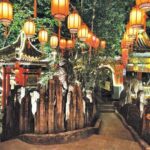Chongqing Restores Ecology and Develops Cultural Tourism to Paint a New Picture
From “Living off the Mountains” to “Nurturing and Enriching the Mountains”
Lush bamboo forests stretch from the foot of the mountains to the clouds, and wild animals play in the wetlands. With flourishing vegetation and winding paths, visitors stroll leisurely through the wetland park… Standing in Lieshen Village, Liangping District, Chongqing, a scene of harmonious coexistence between humans and nature unfolds.
Chongqing, a southwestern “mountain city” surrounded by hills, bears the distinct imprint of mountains in its resource distribution and utilization. Recently, a theme interview group entered Chongqing and witnessed the city’s inspiring transformation: from exploiting resources by “living off the mountains,” to protecting and restoring the ecology, and finally to “nurturing and enriching the mountains” through cultural tourism to revitalize villages.
“In the past, Lieshen Village was rich in mineral and bamboo resources, and villagers made a living through heavily polluting traditional papermaking and small, scattered, and disorderly gypsum mining,” said the village Party branch secretary. Long-term unregulated development led to漫天飞尘 (dust-filled skies), groundwater leakage, and an ecological crisis.
In 2017, after deeply studying the concept that “lucid waters and lush mountains are invaluable assets,” Zhushan Town decided to abandon the crude mining economy.
Riding the momentum of deepening collective forest tenure reform, Zhushan Town shut down gypsum mines that had operated for nearly 20 years, rehabilitating the mines with a focus on natural restoration supplemented by engineering measures. They adopted a “wetland + environmental management” model to conserve water sources and purify surface runoff, closed mountains for afforestation, enhanced forest landscapes, and developed eco-tourism.
Initially, the transition faced significant resistance. “Many villagers believed that ‘closing the mines meant smashing their rice bowls,’ and there was strong opposition,” the village Party branch secretary recalled. Village cadres went door-to-door every evening, explaining the importance of ecological protection and long-term development. Ecological restoration work progressed艰难 (with difficulty) through repeated visits and explanations.
As the ecological environment gradually improved, many villagers began to taste the “ecological dividends” brought by the lush green mountains. “About one-third of the town’s residents now rely on ‘tourism for a living,’ some running homestays, others working in tourist services at scenic spots,” introduced the town’s deputy Party secretary and mayor. Last year, the town’s per capita disposable annual income reached 37,000 yuan.
A shift in mindset also quietly occurred. “Recognizing the importance of lucid waters and lush mountains, villagers now pay extra attention to protecting the surrounding ecological environment when decorating their homestays,” the village Party branch secretary said. Today, Zhushan Town boasts greener mountains, clearer water, and fresher air. Homestays, cafes, and other tourist facilities are scattered orderly, making it a well-known destination for ecological leisure and wellness tourism.
“Last year, our profits exceeded 1 million yuan,” said the owner of Mine Cafe, a popular check-in spot in the Hundred-Mile Bamboo Sea scenic area.
200 kilometers away in Jingguan Town, Beibei District, Zhonghua Village is surrounded by shady orchards and neatly arranged homestay buildings, with a steady stream of vacationing tourists. It is hard to imagine that a few years ago, this was a quarry filled with the roar of machinery and scattered rubble.
Zhou Song, 47, is a native of Jingguan. In 2001, his father Zhou Changyi transferred several hundred mu of mountainous land in Zhonghua Village for quarrying to produce construction stone. Years of extensive mining left behind exposed pits dozens of meters deep and nearly 300 mu in area, with surrounding houses and crops covered in a layer of dust.
With the introduction of the Yangtze River Economic Belt’s requirement to “prioritize environmental protection and refrain from excessive development,” the Beibei District government guided and encouraged the closure of mines. Realizing that ecological restoration was urgent, Zhou Song persuaded his father to shut down the mine and restore the environment, even though the mining license had not expired and sand and gravel prices were rising.
Refilling soil, applying organic fertilizer, conserving water sources… Over several years, more than 20,000 peach and plum trees took root in the quarry. The mine became green mountains, and the mining area turned into a scenic spot. “There is economic value, and the ecological environment has been restored,” Zhou Song said. As more tourists came to enjoy the flowers, pick fruits, and relax, his focus gradually shifted from planting trees to “retaining


